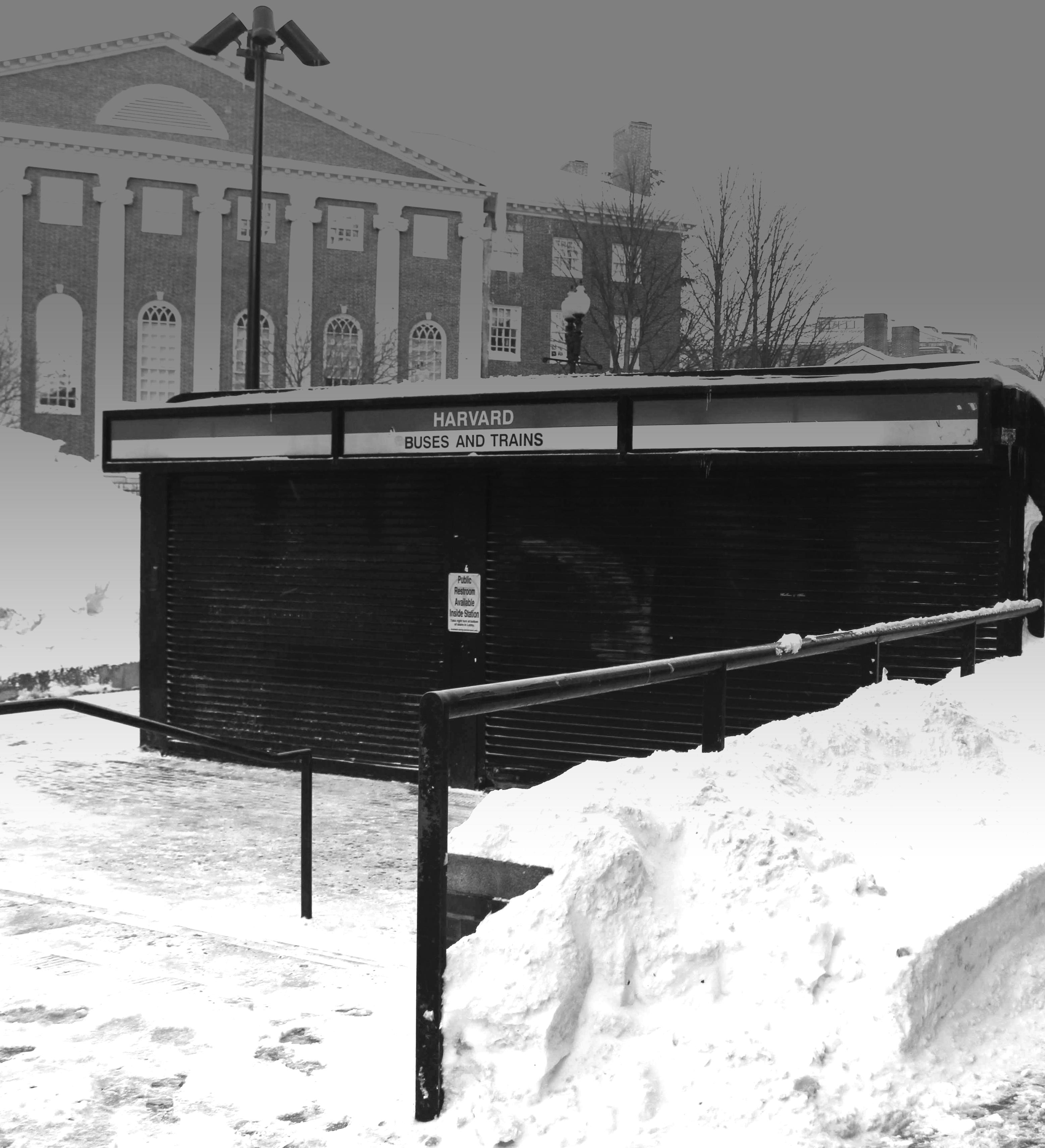
16 minute read
Editorial
THE CRIMSON EDITORIAL BOARD
Last fall, Reihana Emami Arandi, a recent admittee of Harvard Divinity School’s Master of Theological Studies program, was deported from Boston Logan International Airport to her home country of Iran. Despite going through the long, tedious process of attaining a student visa, Arandi’s visa was revoked shortly after landing by Custom and Border Patrol officials, citing “immigrant intent.” She was issued an expedited removal order followed by an additional five-year ban from the United States.
This event is part of a recent trend of Iranian students with valid student visas being denied entry into the country. Just last month, Iranian student Shahab Dehghani was deported shortly after arriving at Logan Airport with a valid student visa. And there have been at least 13 cases since August of Iranian students being deported across the U.S. despite having valid student visas.
While we acknowledge that we do not know the complete facts of this specific case at the moment, the increasing prevalence of such cases reflects a troubling pattern.
The impact of these deportations extends far beyond the individuals concerned. Each builds upon a climate of paranoia and fear for immigrants. The onslaught of these deportations, along with the Trump administration’s insistence on weaponized, anti-immigrant rhetoric and a deeply offensive travel ban targeting several Muslim-majority countries, nurture hostility toward immigrants in this country. We strongly condemn the Trump administration’s dangerous rhetoric and policies that have led to incidents such as Arandi’s. It is of the utmost importance that the U.S. — and particularly institutions of higher education — fully embrace and support immigrants in the name of secure, open cultural exchange.
We find these cases particularly concerning in light of the extensive background checks and increased screening of visa applicants carried out by U.S. immigration authorities. While the process of obtaining a student visa is arduous, applicants from the countries targeted by the original travel ban — including Iran — face even more stringent vetting and longer processing times.
Moreover, according to a new State Department rule introduced last year, visa applicants from most countries are now required to disclose additional information, including social media profiles. For students with valid visas to be turned away at the airport after facing such comprehensive and invasive scrutiny seems inexplicable without the anti-immigrant program emanating from the White House.
It is important to note that these immigration policies have been met with strong opposition from Harvard’s administration. After an incoming Harvard freshman was denied entry into the U.S. and subsequently deported, the University worked with immigration authorities to resolve the issue, resulting in the student’s eventual arrival on campus. A Culture of Fear We strongly condemn the Trump administration’s dangerous rhetoric and policies that have led to incidents such as Arandi’s.
We are grateful that Harvard has the institutional influence to support its international students and lobby for their immigration rights.
Resources such as the Harvard International Office’s 24/7 emergency hotline for international students and scholars facing issues while attempting to enter the U.S. are crucial in helping protect the ability of international students to participate in the production of scholarship on campus.
President Bacow, who has writ
ten to administration officials and lawmakers with concerns about immigration policies, has been vocal in criticizing the unnecessary disruption, delays, and anxiety faced by international students during the immigration process. We commend his work in advocating for those affected by these policies, and urge him to continue that work — even more aggressively — to advocate for students with immigration issues beyond just in the cases of those accepted to Harvard.
This staff editorial solely represents the majority view of The Crimson Editorial Board. It is the product of discussions at regular Editorial Board meetings. In order to ensure the impartiality of our journalism, Crimson editors who choose to opine and vote at these meetings are not involved in the reporting of articles on similar topics.
Submit an Op-Ed Today!
The Crimson @thecrimson
In China, Harvard More Than Turns a Blind Eye OP-ED
Atrocities tend to dominate our news cycle, the slow drip of horror sliding onto our screens. Newlyweds slaughtered in some faraway land. Koalas scorched to death by forest fires. Yet another kid drowned in the Mediterranean. Death, suffering, cruelty.
Sometimes these atrocities move us. We stare into a victim’s smile and wonder how they felt as the plane dove into the ground. We change our profile picture, or attack those who do so for being Western-centric, performative, and shallow. We send thoughts and prayers to those bullet-pierced backpacks. And then inevitably, reluctantly perhaps, we move on, knowing that there is very little we can do, knowing that we eventually have to retreat to our own daily lives and sit down for breakfast. Massacres and muffins.
But not all atrocities go away overnight.
According to estimates by the United Nations, roughly a million Uighur Muslims are currently incarcerated in an ever-growing network of “Vocational Education and Training Centers” in Xinjiang, China. The doublespeak phrasing hints at a fittingly Orwellian reality. From arrests determined by algorithms (no trial or charges needed) to constant surveillance of every corner of the locked dorms, the camps embody a concerning strain of 21st-century authoritarianism. According to reports from survivors, those inside face torture (fingernails pulled out, electric shocks), rape, sterilization, and forced abortions. Their only shot at leaving seems to be giving in, changing what the Communist Party deems “bad emotions” and “ideological contradictions,” eating pork in open defiance of their Muslim faith.
The horror is not confined to the camps, or even to Xinjiang itself. From intimidation and harassment beyond its national borders, to veiled threats against the many university students who returned from vacations abroad to find their families have vanished, the Chinese government has pursued a polBy GUILLERMO S. HAVA
icy of aggressive silencing. A growing police state has come to dominate life in the region, with Uighurs forced through checkpoints that include facial scans and ID requests at mosques and parks. The collection and storage of DNA samples and the use of technology to track citizens’ actions and movements effectively renders even those outside the camps prisoners of the state.
To call the above the most pressing human rights crisis of our time, the biggest threat to fundamental human freedom and dignity, is more than warranted. Not that atrocities, as mentioned above, aren’t present elsewhere. Horror remains depressingly commonplace across the world. Just take a look at the United States’ immigration policies. Yet no other single nation’s actions remain as
egregious as those perpetrated in Xinjiang; no other nation partakes in so many other comparatively concerning abuses; no other nation is actively exporting its own peculiar brand of terror, trying to teach its most dystopian repression tactics to fellow authoritarian regimes. China remains simply unparalleled.
The moral imperative for action appears self-evident; the specific course for it remains unclear. Opposing the world’s largest dictatorial regime is hardly straightforward, particularly when it lies an ocean away. There is, however, one promising lead: While our power as individuals might be limited, we all happen to be affiliated with a rather influential institution, one particularly revered across China that proudly champions “more just, fair, promising world.” A rare avenue for change.
Or perhaps not. Harvard’s ties to China appear to whitewash the atrocities of the Chinese government; our president too busy posing for propaganda outlets with President Xi Jinping and deeming his investment in higher education “admirable.”
Indeed, University President Lawrence S. Bacow has gone out of his way to give undeserved institutional and academic validation to China, laughably stating that Peking University — where most students know nothing of the 1989 Tiananmen protests that rocked their campus, and faculty can be fired for holding “subversive” views — is devoted to “free thought.”
Worse still is the current framing of the Harvard China Fund, originally designed to promote the University’s presence in China. The fund currently packages a voyeuristic exploration of the regime into a fun summer trip — one dependent on universities that are increasingly cracking down on their own student bodies.
One of its student testimonials describes Hong Kong, as seen at the peak of the protests last summer, as interesting for the study of “issues of freedom” but also of “security, and order,” briefly indulging in some politically reprehensible bothsidesism before diving into the more pressing matter of its delightful local cuisine.
With some American universities cutting ties to their Chinese partners out of concern for the impact of authoritarianism on free academic pursuit, our institution appears determined to do the exact opposite.
Harvard is not known for taking brave moral stances. It was infamously one of the last schools to divest from South Africa during apartheid, and did so only partially; it has repeatedly refused calls to divest from fossil fuels and the private prison complex. Yet its attitude towards China — the silent abetting of a regime so outrageous in its actions, the willingness to use its influential brand to praise propagandistic institutions, the shoulder-rubbing with the chief executors of a humanitarian catastrophe — stands out as a particularly disgraceful stain on our history, a concerning disregard for basic human decency.
COLUMN
6195 Miles Away
Javhlan Amgalanbaatar DARING TO BE
Imagine looking at an eternal blue sky, open steppe with sheep and goats grazing on the grass, a few yurts scattered over an enormous land, and horses roaming freely. Then imagine a busy city with a monastery amongst a few modern skyscrapers, many historical buildings, and suffocating air pollution in the winter, caused by the burning of coal.
Both images come to me when I think of home. The breathtaking nature of the Mongolian countryside and the vibrant city of Ulaanbaatar, Mongolia. The summer before coming to Harvard, I tried to fill my head with as many images of my city and countryside as possible, relishing the warmest comfort I find in the place I grew up in. When the time came to board a plane to fly 6195 miles and say goodbye to everything I associate with home, I could not help but cry and dread the homesickness that would surely hit me once I left. But little did I know that this very homesickness could deter me from growing for the better when taken too far. Although the change was drastic and it was totally fine to take time to figure things out, I got too caught up in missing my previous home but not actually forming a new home at Harvard.
Cambridge, with its unpredictable weather and busy streets, and Harvard, with its intimidating reputation and limitless opportunities, were cold, uncomfortable, and daunting. Every
thing from the way people greeted each other to the level of awareness on societal issues like mental health was different. In the midst of all this strangeness, I craved comfort. Thoughts of home invaded my mind in the strangest moments. I would daydream of my beloved street in Ulaanbaatar while walking in the Yard and listen to Mongolian throat singing while doing laundry. Pangs of longing for my home on the other side of the world were persistent.
I am certain that many students at Harvard, especially freshmen, can relate to this feeling of homesickness, albeit in different forms and amounts. Most of us miss home, but at the same time, we all want to form our new home here at Harvard.
Throughout this ongoing period of homesickness, I’ve realized that although it is crucial to allow ourselves to miss home and take our time settling in, we must be self-aware enough to recognize when this homesickness is keeping us from functioning at our best. The balance is, of course, difficult to get right, but the line for me was when I was spending more time missing home than actually engaging with my surroundings.
Feelings of disconnection and loneliness led me to seek refuge in the place I grew up in. During those times, I closed myself unnecessarily, allowing the moments at Harvard to pass before me without being fully present.
By living in an imaginary, idealized version of my distant home, I’ve become absentminded and detached from my activities here. Yearning to finish the semester and go home has prevented me from growing and fully immersing myself in the completely uncomfortable but rewarding place that is Harvard.
This realization has allowed me to become more proactive and find comfort in my daily life. Even though Harvard is unlike Ulaanbaatar, the
Yard’s stunning colors in autumn absolutely captivate me and the tourists happily taking pictures fill my heart with warmth. I love Annenberg food and the familiar faces of staff and fellow freshmen, who make me look forward to dining hall meals. Although aches of loneliness creep in every now and then, coming back to Canaday and my roommates after a long day feels like returning to my safe haven at Harvard.
So I leave a note to myself and others who might be struggling with homesickness — allow yourself to feel the nostalgia of home, but also be conscious of the amount of energy put into dwelling too much on the familiar. I miss home, but I am trying to derive strength from my cherished home to be braver in my endeavors at Harvard.
After all, if our goal is to grow into better versions of ourselves during college, we must be willing to plunge into the uncomfortable and unknown. These days, I happily listen to Mongolian throat singing while walking to class, with renewed strength found in my background and excitement for all I will be learning at Harvard. I hope that next time I return to my lively city in the land of blue skies, I will also miss my new home — home amidst milder winter and warm people I have been lucky to encounter here.
Medical Faculty Council to Vote on Divestment HMS FROM PAGE 1
Faculty Council advises the school’s dean in major policy decisions.
Recently, the council created a sub-committee to address climate change, according to the sub-committee’s co-chair Caren G. Solomon ’84.
Solomon, an associate professor at the Medical School, said the major health problems associated with global climate change are why it is appropriate for Medical School faculty as well as physicians and scientists to weigh in.
“As physicians and scientists at the medical school, we feel we have a responsibility to protect health,” Solomon said.
The resolution highlights the potential health consequences of climate change, which include “heat-related illnesses, respiratory and cardiovascular diseases, insect- and waterborne diseases, allergies, malnutrition, traumatic injuries, and mental health conditions.”
It also argues the climate crisis has a detrimental impact on health care.
“The climate crisis is also causing disruptions to health care delivery - including damage to hospitals and clinics and interruptions in care and in the supply of equipment and medications needed for care by storms, flooding, and wild
Caren G. Soloman ‘84 Harvard Medical School Associate Professor
fires,” the resolution reads.
University spokesperson Jonathan L. Swain declined to comment on the resolution on behalf of the University and the Harvard Corporation.
Medical School spokesperson Laura DeCoste declined to comment on behalf of the Medical School and Daley. The Faculty of Arts and Sciences voted overwhelmingly last week in support of a similar resolution urging the Corporation to divest.
Since the vote, roughly 500 additional faculty members from across the University have signed an open letter to University President Lawrence S. Bacow and members of the Harvard Corporation urging fossil fuel divestment, according to Harvard Faculty for Divestment’s website.
That letter has now garnered more than 1,000 signatures.
Solomon said the Medical School’s vote was not coordinated with the vote carried out by the FAS, but added that she thought it was useful to know what her colleagues were doing.
“I just thought their vote was fantastic because it made such a strong, important statement,” she said.
“We hope to be able to do the same,” she said.
james.bikales@thecrimson.com michelle.kurilla@thecrimson.com
CORONAVIRUS FROM PAGE 1 Programs Postponed in China Due to Coronavirus
the semester, but all but one chose to instead come to campus and enroll in classes here, thus deferring their participation in term time study abroad in China to a later semester,” Nardozzi wrote.
Nardozzi added that though it is too early to know how the epidemic will affect summer programs, the Office of International Education is currently operating under the assumption that students will be able to study abroad in China over the summer.
Harvard’s China Health Partnership — a coalition of researchers focused on Chinese healthcare policy and practices — has delayed all conferences and teaching seminars scheduled for the spring and early summer until late June, professor and program director Winnie C. Yip said in an interview. In the meantime, researchers and collaborators will be working on “preparatory” work from home while also working to directly alleviate the outbreak’s impact on Chinese hospitals and help develop policy responses.
Yip said the outbreak has shifted some of HCHP’s future priorities: The partnership will now devote more time and resources to developing a comprehensive online healthcare platform for China.
“One of our research agendas is actually looking at the potential for an online platform for the healthcare industry in China. In fact, during this epidemic, that online platform is playing some very helpful role in easing the burden of hospitals. So that’s something that we will be spending even more time and resources on,” Yip said.
The Harvard Center Shanghai — which partners with Chinese scholars and universities to host conferences and support research — reopened Monday with its staff operating remotely, wrote Yi Wang, the center’s executive director for University programs. The delayed opening date came after the Shanghai government mandated that companies not reopen until Feb. 9.
The Harvard-China Project on Energy, Economy, and Environment’s operations have not been significantly affected, Chris P. Nielsen, the project’s executive director, wrote in an email. However, an upcoming visit to a field site near Beijing was postponed, and a planned workshop at Harvard this spring is also likely to be postponed, Nielson wrote wrote.
The Harvard-China Project has also delayed the announcement of a summer internship opportunity for Harvard College students in China, and may have to cancel the program, according to Nielsen.
The Harvard China Fund has postponed interviews for its Harvard China Student Internship Program to late February or early March, according to a statement on its website.
The Fairbank Center for Chinese Studies is closely monitoring developments in mainland China and is in contact with students currently in China who have received Fairbank Center funding, according to a statement on its website. The Center is still receiving summer funding requests, although final decisions will depend on the University’s travel recommendations as conditions change.
luke.williams@thecrimson.com matteo.wong@thecrimson.com
The latest on student life.





